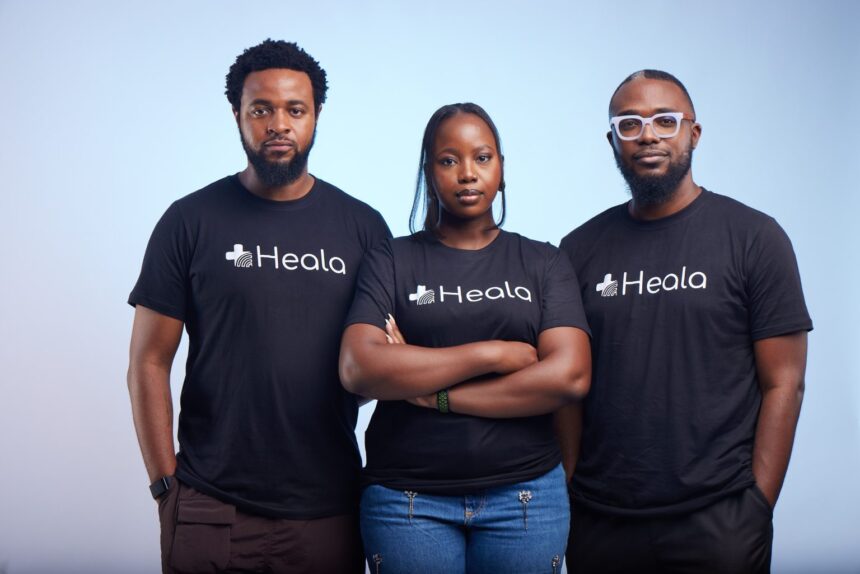When Nigeria went into lockdown in 2020, Ofuzim Anderson Oriahi, the CEO of Heala Tech, found himself confronting both a national crisis and a personal one, as his newborn daughter developed a health complication, yet hospitals were inaccessible and family support was out of reach.
Stranded with limited options, he turned desperately to Google for answers, a moment that exposed to him just how disconnected Nigeria’s healthcare system really was.
“We were scared we would lose her,” he recalls. “I was searching Google, trying anything I could find that might help.”
When restrictions eased, he and his wife finally took their daughter to a hospital. But they were forced to start her care from scratch because no documented medical record existed.
What you should know about Heala
According to Oriahi, he began questioning why healthcare in Nigeria felt so disconnected while sectors like banking and logistics had long gone digital. Out of that frustration, Heala was born.
“I kept asking myself, why can’t I pull up health records the same way I can pull up my financial records?” he says. “That was my lightbulb moment. Healthcare providers are offline. There’s no digital infrastructure to connect them.”
Oriahi went on to run a software development firm, ZBM, until the pandemic, and his daughter’s health crisis pushed him fully into healthcare.
By 2022, he had incorporated Heala with two co-founders: Ifeoluwa Aribatise, a health insurance expert from Reliance Health, and Ezegozie Eze, a former general manager at Universal Music Group Nigeria.
According to the team, Heala piloted with insurers in 2023 and officially launched in 2024. Since then, it has processed nearly 300,000 healthcare transactions across consultations, lab tests, and medication orders.
Understanding Heala’s model
Heala’s ambition is clear: to create the connective tissue of healthcare in Africa, much like Interswitch did for Nigerian banking. Today, the platform has aggregated more than 2,500 providers; hospitals, pharmacies, labs, and independent doctors.
At the core of the startup are two flagship products:
- A virtual clinic platform that integrates seamlessly with tools providers already use, from spreadsheets to mobile apps. It powers telemedicine consultations, digital prescriptions, lab requests, and hospital referrals in one chain.
- An insurance management system that tackles claim bottlenecks through AI-powered standardisation. This technology converts disparate entries like “paracetamol,” “PCM,” or misspelled drug names into uniform data, cutting claim approval times from months to minutes.
“We wanted to meet providers at their level of digital adoption,” Oriahi explains. “Whether they use spreadsheets, WhatsApp, or a mobile app, our system connects with what they already have.”
How patients experience Heala
For insured users, Heala operates in the background. A customer using their HMO’s app may click “telemedicine,” get matched with a doctor, receive a digital prescription, and even have medication delivered, all powered by Heala without the user knowing.
For the uninsured, the company has rolled out My Heala, a consumer app offering affordable digital-first insurance plans in partnership with HMOs.
By prioritising preventive care and virtual consultations, the company says the plans reduce costs while expanding access to people who have never had insurance before.
Looking beyond Nigeria
Since April 2024, Heala has grown rapidly. Around 20 insurers are now plugged into its network, giving it a foothold in about 25% of Nigeria’s insurance market. Roughly 58% of users return monthly or bi-monthly, which Oriahi says signals a cultural shift toward preventive care.
Heala plans to pilot its services in Ghana and Kenya in 2026, with full commercial launches by 2027. The choice is strategic: Ghana hosts many of the same insurers already on Heala’s network, while Kenya offers a digitally savvy market with strong healthtech adoption.
The pilots will begin as complimentary services, giving Heala time to adapt to new regulatory landscapes before scaling.
Backed so far by Constant Ventures and founder contributions, the company remains in pre-seed stage with margins of about 40%. Oriahi says the team is actively speaking with investors ahead of a 2027 seed round.
With nearly 300,000 healthcare transactions already processed and a roadmap for regional expansion, industry experts say Heala is positioning itself as a critical player in transforming how Africans access and experience healthcare.
Talking Points
It is noteworthy that Heala is attempting to do for healthcare what Interswitch did for finance; build the rails that allow providers to connect, transact, and share data seamlessly.
By integrating hospitals, insurers, pharmacies, and labs into one ecosystem, Heala is addressing one of Nigeria’s most pressing challenges: fragmented, paper-based healthcare delivery that leaves patients without continuity of care.
At Techparley, we see how this approach could shift the health sector from curative to preventive care. However, scaling digital healthcare infrastructure in Nigeria comes with structural barriers. Uneven levels of digital adoption among providers, regulatory uncertainty, and talent flight could slow progress if not carefully managed.
As Heala looks to expand into Ghana and Kenya, partnerships with insurers, governments, and international health bodies will be crucial. Regional scaling will test how adaptable its system is across different regulatory and cultural landscapes.
With the right strategic backing and regulatory clarity, Heala has the potential to become the backbone of Africa’s digital healthcare system; enabling access, efficiency, and transparency at scale.





